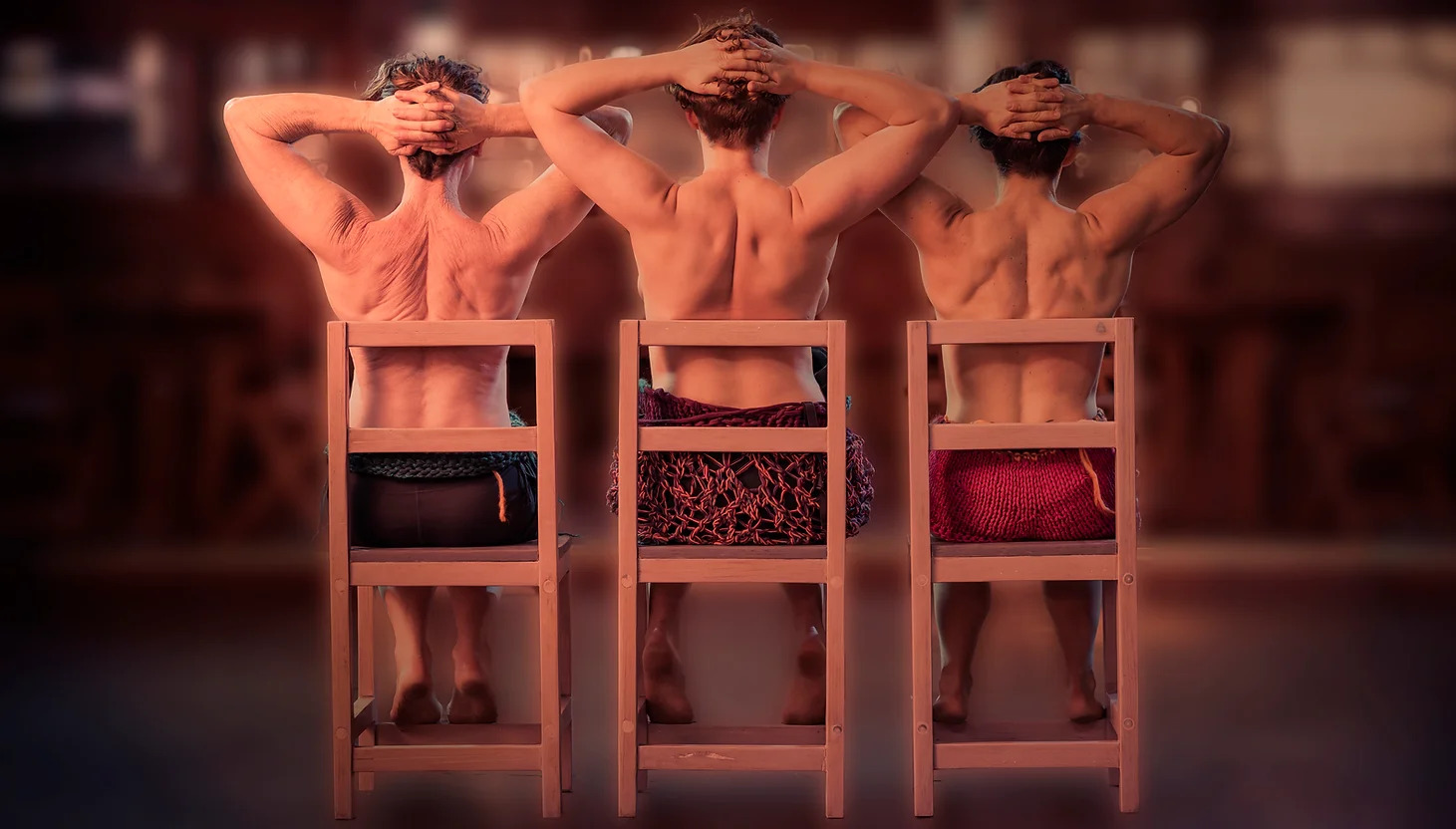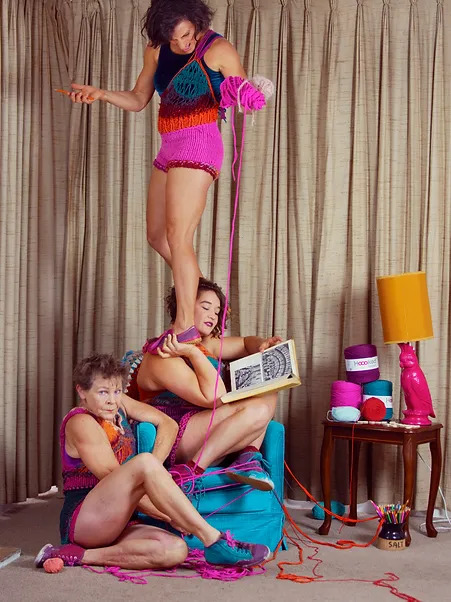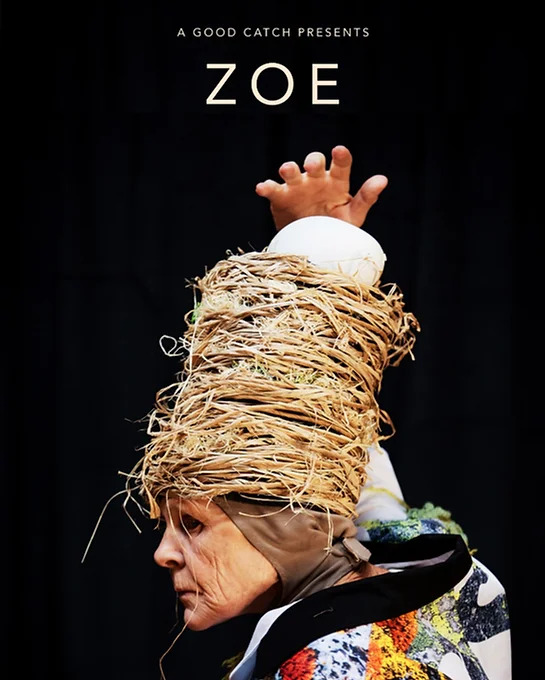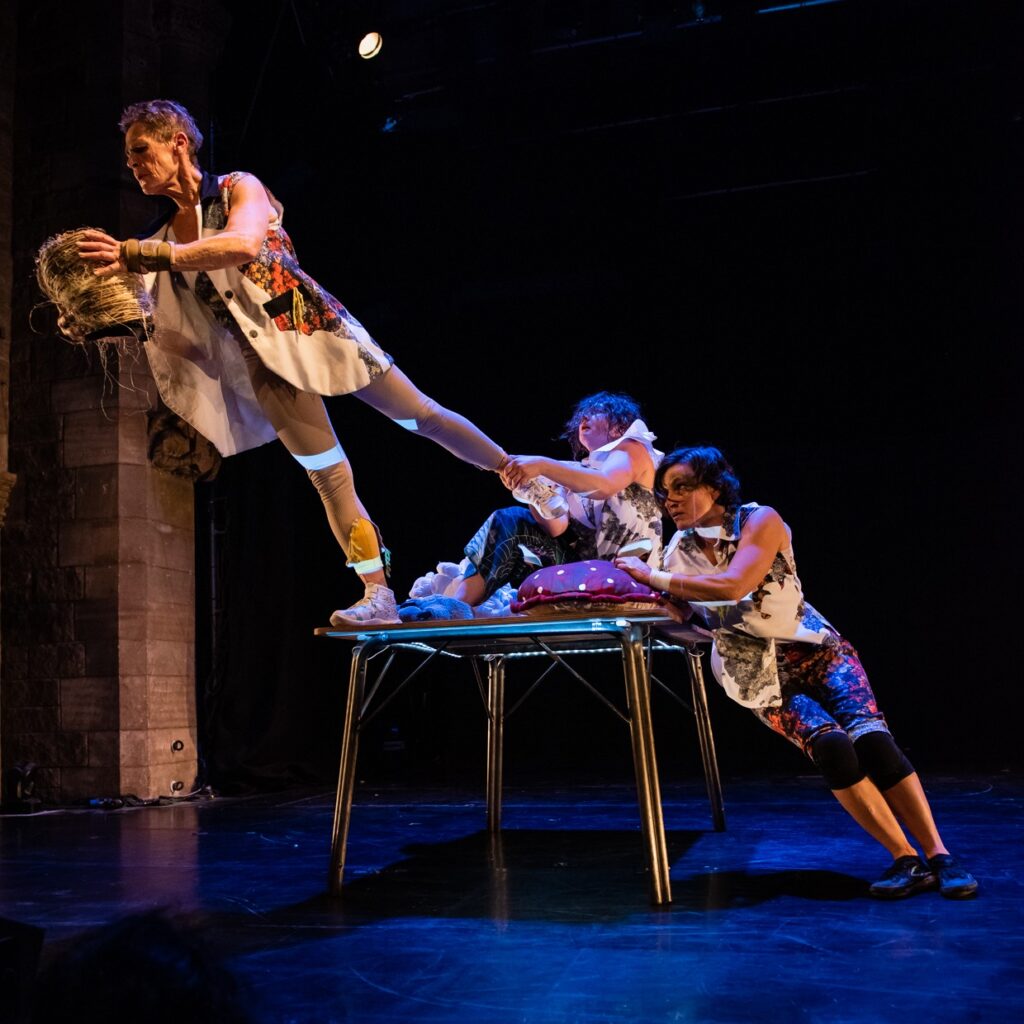
Part 2 MARK STATMAN: MEXICO AND THE POETRY OF GRIEF AND CELEBRATION
Part 2 of my interview with Mark Statman looks closely at Mark’s Latin American poetic influences, his life in Mexico and ends with an extract


I interviewed A Good Catch Circus whose experimental work questions what is lacking in the circus art-form. Spenser, Debra and Sharon say about their work: “We disagree, we divulge, we digress, we listen and we change. Our process allows the physical connections that circus bodies share to flourish and to deepen our understanding of difference. We aim to experiment without fear of failure, without adhering to genre expectations, and with curiosity about what circus can be.”
Leslie: How is your show Casting Off alternative and different? What’s the show like? How do you prepare yourselves for the improvisational parts of the show, particularly the spoken content?
Spenser: Casting Off differs from conventional/ traditional circus by being more than a display of physical feats with music. It has a non-liner narrative that covers women’s experiences across 3 generations. There is no music in the work, this is very unusual in contemporary circus. Our live acoustic voices are the only sounds in the show. We are in conversation, with each other and the audience. Casting Off has many similar attributes to a traditional circus too. We are all acrobats, and the age range harks to the family/traditional circus format. As for the improvised parts of the show. We are able to improvise because we have confidence in the show’s structure, which allows us to have spontaneous responses that are unique to each performance. They are always better when we have been spending time together as friends outside of the work. Our banter with each other is stronger and we are freer to be more vulnerable in the work.

Leslie: Zoe is a larger production taking on the theme of climate breakdown. How did the show begin, grow and develop? How does it differ from Casting Off? What actions / moments / moves / effects are you most proud of in the show?
Spenser: Zoë our newest work was developed during covid. We spent a lot of time on zoom and in different houses working on physical material. Once we were able to gather in person again, we realised that we each had very solo characters that then fed into the ensemble nature of our work. Each performer moves with a different quality, be that Mushroom, Nest or Cloud. Zoë is a mini world that the audience gets to view. We as a company don’t want to stick to a formular for making work and we seek out new experiments within the circus artform. Casting off was focused around Text and Circus. With Zoë we have worked with costumes that have soft sculptures in them, as well as working with projection to create texture and depth to the world Zoë comes alive in, and we also only have one circus apparatus, a simple looking but strong table as our 4th member of our ensemble. I love that we have been able to create such a different 2nd work. I’m proud that we were able to stick to our core practices and not get sucked in to making the same work again. I’m proud that we are brave enough to let ourselves be pushed out of our comfort zones. I also really love the tension and hope that we create in Zoë. The audience watches us on the edge of their seat as they root for us to succeed.
Leslie: How did the three of you come together to found the company? How do your temperaments and skills complement each other? What difficulties have you overcome, and how did you overcome them?
Spenser: We had all been working for a company in Australia called Circus Oz. During that time we would regularly talk about what we wanted to see on stage in the circus world and about the different ways to make work. Then in 2017 there was a new experimental circus festival starting called the Sidesualt Experimental Circus Festival. Spenser and Sharon decided that they wanted to apply for the festival and asked Debra to join them if they were successful. This was not only the start to our company A Good Catch Circus, but also the beginning of our creative development for Casting Off.
We all bring very different complementing traits to the company. Spenser is our home base driving the company in practical ways through administration, But she is also our memory bank. She has a superpower for remembering acts, choreography and details. She holds the shows in her head and often has the helicopter view alongside the on the ground detail all at once. Sharon is our physical force. She is always up for a new trick or conditioning remiges. She pushes us to work past our fears and inspires us with her own bravery. She is always looking to up the risk factor of the works. She wants the audience to care about us and feel invested in us when we are on stage. Debra is our philosophical and conceptual explorer. She seeks connections in our physical work to the concerns in our lives, from the domestic to the universal. She likes to experiment with collaborative process and insists that the culture we create together is vital in making the show. All of us love working from the physical, it’s our happy place. Where we connect, chat, and find our work. The circus languages of acrobatics and aerial work intersect with our lives and the world around us to contribute to the work. Our biggest difficulty is that we are all at different stages of our lives. Yes ,we also celebrate this, but it also comes with its own challenges. Such as negotiating touring schedules with teenage children and bodies that require different levels of training and rehearsal. We approach all of this with care. We are all very good friends and so we talk about how to make this work for each of us a lot. This is one challenge we are always working with, as it is always shifting as we move forward in time.

Leslie: What underpins the art of acrobatics in terms of technique, practice and emotional skills? How do you stay fresh, physically, mentally and creatively?
Spenser: Regular training and connection are the underpinning factor to our skill creation. For us we are friends, colleagues, and artistic collaborators. Our knowledge of each other has depth and breadth. Looking after each other listening, arguing and laughing are all prioritised in our creative process. Trust is one of the big ones. It gets built quickly as we are literally holding each other off the ground. We all understand that we will make mistakes and that we are human. Staying fresh requires continued learning by changeling ourselves to resist already know skills and ideas. It takes effort to deviate from existing pathways. Including, ideological, physical, and emotional, and we relish in the effort.
Leslie: What have you learned about yourselves through working together as A Good Catch Circus? How has it changed and developed your lives?
Spenser: Creating A Good Catch Circus has fulfilled a lifelong dream of mine to create my own work/company. To be able to make work and learn alongside both Sharon and Debra is a real privilege. They are both such powerhouses and it has changed the way I think about what I want for the rest of my career. They prove that you don’t have to give up on your performing career as you get older. You just must be smarter about it.
Debra: In A Good Catch I have found colleagues who are willing to take circus into conceptual territories. Simultaneously, I have forged deep friendships, that are both respectful and challenging and allow me to continue to discover the best possible version of myself.
Sharon: It’s a process isn’t it, It’s the constant joy of learning. Being able to challenge myself and develop my performance quality in a safe and inspiring space.
Next week I interview abstract artist Karen Martin about how she discovered the joys of experimental art.
ABOUT LESLIE TATE’S BOOKS:

Part 2 of my interview with Mark Statman looks closely at Mark’s Latin American poetic influences, his life in Mexico and ends with an extract

I interviewed international poet and translator Mark Statman about Volverse/Volver, his 14th published collection. Mark, who has won national arts awards, is Emeritus Professor of Literary

I interviewed Lisa Dart, finalist in the Grolier, Aesthetica and Troubadour Poetry Prizes and author of The Linguistics of Light (poems, Salt, 2008), Fathom (prose

I interviewed writer Julia Lee Barclay-Morton about her experience of autism. Julia began as an experimental dramatist in New York, moving to the UK to

I interviewed Gillean McDougall from Glasgow, who edited the collaborative projects Honest Error (on Charles Rennie Mackintosh and his wife Margaret Macdonald) and Writing the
| Cookie | Duration | Description |
|---|---|---|
| cookielawinfo-checkbox-analytics | 11 months | This cookie is set by GDPR Cookie Consent plugin. The cookie is used to store the user consent for the cookies in the category "Analytics". |
| cookielawinfo-checkbox-functional | 11 months | The cookie is set by GDPR cookie consent to record the user consent for the cookies in the category "Functional". |
| cookielawinfo-checkbox-necessary | 11 months | This cookie is set by GDPR Cookie Consent plugin. The cookies is used to store the user consent for the cookies in the category "Necessary". |
| cookielawinfo-checkbox-others | 11 months | This cookie is set by GDPR Cookie Consent plugin. The cookie is used to store the user consent for the cookies in the category "Other. |
| cookielawinfo-checkbox-performance | 11 months | This cookie is set by GDPR Cookie Consent plugin. The cookie is used to store the user consent for the cookies in the category "Performance". |
| viewed_cookie_policy | 11 months | The cookie is set by the GDPR Cookie Consent plugin and is used to store whether or not user has consented to the use of cookies. It does not store any personal data. |
2 responses
Fascinating. I’ve never watched a traditional circus perform live, but I’d love to watch A Good Catch Circus. Their journey of creation sounds fascinating, and I hope they carry on experimenting and creating new spectacles. Thanks, Leslie.
Yes, I’d go and see them! I’m keeping an eye out for a performance near me…